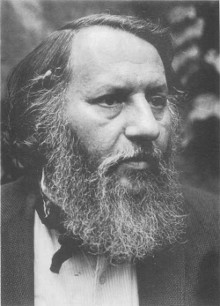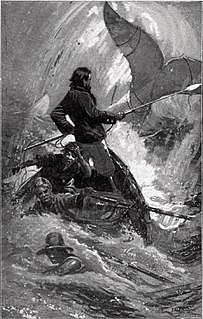
Laurence van Cott Niven is an American science fiction writer. His best-known work is Ringworld (1970), which received Hugo, Locus, Ditmar, and Nebula awards. The Science Fiction and Fantasy Writers of America named him the 2015 recipient of the Damon Knight Memorial Grand Master Award. His work is primarily hard science fiction, using big science concepts and theoretical physics. It also often includes elements of detective fiction and adventure stories. His fantasy includes the series The Magic Goes Away, rational fantasy dealing with magic as a non-renewable resource.

Michael John Moorcock is an English writer and musician, primarily of science fiction and fantasy, who has also published literary novels. He is best known for his novels about the character Elric of Melniboné, a seminal influence on the field of fantasy since the 1960s and 1970s.
Equilibrium, in several sciences, is the condition of a system in which all competing influences are balanced.

A fictional universe is a self-consistent setting with events, and often other elements, that differ from the real world. It may also be called an imagined, constructed or fictional realm. Fictional universes may appear in novels, comics, films, television shows, video games, and other creative works.
Earth is a planet in the Solar System, and the third planet from the Sun.

Avram Davidson was an American writer of fantasy fiction, science fiction, and crime fiction, as well as the author of many stories that do not fit into a genre niche. He won a Hugo Award and three World Fantasy Awards in the science fiction and fantasy genre, a World Fantasy Life Achievement award, and an Ellery Queen's Mystery Magazine short story award and an Edgar Award in the mystery genre. Davidson edited The Magazine of Fantasy and Science Fiction from 1962 to 1964. His last novel The Boss in the Wall: A Treatise on the House Devil was completed by Grania Davis and was a Nebula Award finalist in 1998. The Encyclopedia of Science Fiction says "he is perhaps sf's most explicitly literary author".
Death is the termination of the biological functions that sustain a living organism.

The Twelve Kingdoms is a Japanese series of fantasy novels written by Fuyumi Ono and illustrated by Akihiro Yamada. The first entry in the series called "The Twelve Kingdoms: Sea of Shadow" was published by Kodansha in Japan in 1992; the last Kodansha volume was released in 2001. In 2012 the series was resumed under the Shinchō Bunko line from Shinchosha. Shinchosha has also begun reprinting the older volumes with new cover and interior art from Akihiro Yamada. The first new publication of the series in six years was announced for a 2019 release date.
Real person fiction or real people fiction (RPF) is a genre of writing similar to fan fiction, but featuring celebrities or other real people. In the past, terms such as actorfic were used to distinguish such stories from those based on fictional characters from movies or television series.
A gun is an object that propels a projectile through a hollow tube, primarily as weaponry.

"Dagon" is a short story by American author H. P. Lovecraft, written in July 1917, one of the first stories he wrote as an adult. It was first published in the November 1919 edition of The Vagrant. Dagon was later published in Weird Tales and is considered by many to be one of Lovecraft's most forward looking stories.
Outcast or Outcasts may refer to:

Voyage to the Bottom of the Sea is an American science fiction television series based on the 1961 film of the same name. Both were created by Irwin Allen, which enabled the movie's sets, costumes, props, special effects models, and sometimes footage, to be used in the production of the television series. Voyage to the Bottom of the Sea was the first of Irwin Allen's four science fiction television series, and the longest-running. The show's theme was underwater adventure.

Antarctic Conquest: the Story of the Ronne Expedition 1946-1948 is a 1949 science book by Norwegian-American Antarctic explorer Finn Ronne and science fiction writer L. Sprague de Camp, published in hardcover by G. P. Putnam's Sons. The role of de Camp, who was commissioned as a ghost writer to recast Ronne's manuscript into publishable form, is uncredited. Ronne's working title was reportedly "Conquering the Antarctic".

In English-speaking popular culture, the modern pirate stereotype owes its attributes mostly to the imagined tradition of the 18th century Caribbean pirate sailing off the Spanish Main and to such celebrated 20th century depictions as Captain Hook and his crew in the theatrical and film versions of Peter Pan, Robert Newton's portrayal of Long John Silver in the 1950 film of Treasure Island, and various adaptations of the Eastern pirate, Sinbad the Sailor. In these and countless other books, movies, and legends, pirates are portrayed as "swashbucklers" and "plunderers." They are shown on ships, often wearing eyepatches or peg legs, having a parrot perched on their shoulder, and saying phrases like "Arr, matey" and "Avast, me hearty." Pirates have retained their image through pirate-themed tourist attractions, traditional film and toy portrayals of pirates, and the continued performance and reading of books and plays featuring pirates.

Tales of Tomorrow is an American anthology science fiction series that was performed and broadcast live on ABC from 1951 to 1953. The series covered such stories as Frankenstein, starring Lon Chaney, Jr., 20,000 Leagues Under the Sea starring Thomas Mitchell as Captain Nemo, and many others featuring such performers as Boris Karloff, Brian Keith, Lee J. Cobb, Veronica Lake, Rod Steiger, Bruce Cabot, Franchot Tone, Gene Lockhart, Walter Abel, Cloris Leachman, Leslie Nielsen, and Paul Newman. The series had many similarities to the later Twilight Zone which also covered one of the same stories, "What You Need". In total it ran for eighty-five 30-minute episodes.
It was called “the best science-fiction fare on TV today” by Paul Fairman, editor of If.

Nautical fiction, frequently also naval fiction, sea fiction, naval adventure fiction or maritime fiction, is a genre of literature with a setting on or near the sea, that focuses on the human relationship to the sea and sea voyages and highlights nautical culture in these environments. The settings of nautical fiction vary greatly, including merchant ships, liners, naval ships, fishing vessels, life boats, etc., along with sea ports and fishing villages. When describing nautical fiction, scholars most frequently refer to novels, novellas, and short stories, sometimes under the name of sea novels or sea stories. These works are sometimes adapted for the theatre, film and television.
Air pirates are a type of stock character from science fiction and fantasy.










